Terrorism

The Boston Marathon bombing is so shocking because it was obviously done by someone(s) who wanted to prove something not to themselves, but to others. Could they display to the world his repressed rage enough? Could they divert attention to their cause enough? Could they maim and kill the innocent for some misguided agenda enough? That is what makes this act of terrorism so terrifying: a sick person or people trying to prove something to others by targeting those who are simply proving something to themselves, or trying to do something for others. It is jarring.
Ninety minutes before the bombs detonated, I was concluding a presentation on Jesus’ parable of the Good Samaritan. That recent immersion into Luke’s narrative shaped my video viewing of the bombing’s aftermath. The one who “fell into the hands of robbers” was everywhere. The assaulted and bloodied were scattered by the side of the road, in this case, Boylston Street. Instead of people passing by on the other side, however, it was quite the opposite. Spectators and emergency medical personnel waded into the grisly scene and treated the wounded with exquisite care.
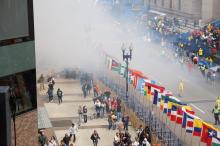
What do you say in the face of evil?
The stories from Monday’s attacks at the Boston Marathon are heartbreaking, gut-wrenching. One in particular stands out to me. A woman was waiting for her husband to cross the finish line when the bombs exploded. For three hours she searched frantically for him, not knowing if he was alive or dead, not knowing if he was frantic and looking for her. Her voice cracked and tears flowed with the raw memory as she told of the moment when she and her husband embraced.
Moments like this, even when they end happily, remind us of our vulnerability. As hard as we try to protect ourselves with heightened security measures, we know that complete invulnerability is impossible. I am vulnerable. My wife is vulnerable. My children are vulnerable. We cannot escape it.
In the face of gun violence and bombings, gender violence and rape, we would be irresponsible not to ask big questions about evil and human vulnerability.
A few hours after the bombing, President Barack Obama addressed our natural desire to carry out justice after these events.
[M]ake no mistake; we will get to the bottom of this. We will find out who did this, we will find out why they did this. Any responsible individuals, any responsible groups, will feel the full weight of justice.
Like the president, I want to take action against evil and I want to know I am secure. I hate admitting that I’m vulnerable. But the president’s words didn’t reassure me. They made me feel more vulnerable because the phrase “full weight of justice” is always a veiled call to violence.
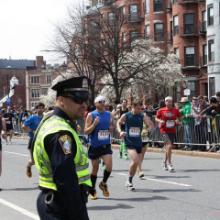
No sooner had the reality of the Boston Marathon bombing sunk in on Monday afternoon than Muslim activists in the U.S. began sending out a slew of news releases, tweets, and Facebook messages urging prayers and aid for the victims — and condemning whoever was behind the horrific attack.
“American Muslims, like Americans of all backgrounds, condemn in the strongest possible terms today’s cowardly bomb attack on participants and spectators of the Boston Marathon,” Nihad Awad, executive director of the Council on American-Islamic Relations said in a statement on Monday.
It’s a familiar race against time for Muslim groups. Almost as soon as the smoke cleared around Copley Square, they knew from long experience that some would immediately point the finger of blame in their direction.
Many widely believed Muslims were behind the 1995 Oklahoma City bombing, until American militiaman Timothy McVeigh was convicted of the crime.
“We also call for the swift apprehension and punishment of the perpetrators,” Awad added, echoing a statement from the Muslim Public Affairs Council that called on “all of us as Americans to work together to bring those responsible to justice.”

I am tormented by what took place at the Boston Marathon. An iconic event that is supposed to be a celebration of achievement and companionship will be scarred with memories of injury and death for years to come. However, the source of my distress is not only the horrific sights and sounds of violence and terror, but in such dreadful disasters I also struggle with our common conceptions of a loving God. As many wonder where God was in the midst of such tragedy, and while others question why God did not (or could not) prevent such terror from taking place, I am personally tormented with my belief of where God's love will be placed in its aftermath.
On the one hand, we are told “blessed are those who mourn, for they will be comforted” (Matthew 5: 4), and in receiving the Gospel in such ways, we take comfort in the belief that God is with those who suffer and directly at the side of those who struggle. This conception of a loving God offers relief for the victims in Boston and all those on the receiving end of transgression. However, while we proclaim a God in solidarity alongside those in pain, we are also often told that God is present with those who cause the pain, for the love and forgiveness found in Jesus is inclusive, it has no boundaries, and nothing is able to “separate us from the love of God in Christ Jesus our Lord” (Romans 8:38-39). So just as Jesus was sent to soothe those who suffer, he also absolves those responsible for the suffering. As a result, we are left with a God who seems to love both saints and sinners, which means we are both comforted and confronted in the aftermath of tragedy in Boston.

It is in times and tragedies like those that happened in Boston that our call to pray for our enemies is most difficult. May we be faithful to pray for them despite our circumstances.
Lord have mercy, Christ have mercy on me, a sinner. Lord have mercy, Christ have mercy, on all of us, sinners.
Father, we don't know who was behind the tragedies in Boston, but we do know that they were human. And we know we are to pray for our enemies.
In Jesus we see humanities true identity as ones who are to be agents of life, not death. Jesus, as first of New Creation, invites all humanity to reflect and participate in New Creation.
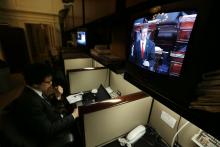
While I stand with Sen. Rand Paul on the question of the use of militarized spy drones in American airspace and (potentially) on Americans, I am deeply troubled by our use of these weapons in other lands, too, where they are responsible for the deaths of hundreds of children and other innocents.
There's something dishonorable about killing without the risk associated with the act, no matter how heinous the target or valuable and beautiful the persons you put at risk in order to personally kill.
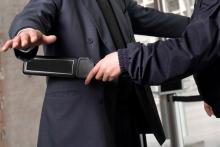
As I stood in line at Orlando International Airport, a little girl did not want to go through airport security. She was desperately clinging to her grandmother.
I had already been pondering, as I *always* do, the enormous investment the nation has made in these checkpoints, going on 12 years now, in response to the actions of 19 men. 19 persons. These lines are here forever now, just one more cost of the fall, one more insult to our usual illusion of normalcy.
I'm not inconvenienced by the searches or the scanners, or worried about my personal liberties, though half stripping in public is embarrassing (we men have to take our belts off). At least the posture in those full-body cylinders reminds me that, at a very real level, this ought to be my more constant pose: found wanting, presumed guilty, and in need of throwing up my hands in surrender.
Still, I marvel at the sheer amount of money we must spend for all of this equipment and personnel, hoping this all somehow makes us safe. I'm skeptical.
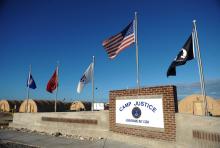
The myth that President Barack Obama closed Guantanamo his first year in office persists, but four years later the detainees are still there. Can justice be served?
I wanted to find out for myself. Over the past month, the Obama administration has started prosecuting some of the Guantanamo prisoners. They are tried in a specially constructed courtroom at Guantanamo, under military commissions rules touted to restore the rights absent under former President George W. Bush’s tribunals.
The trial logistics are a challenge: the tribunals convene periodically on the Guantanamo naval base under tightly controlled conditions. Additionally, the hearings are simulcast to military bases in the U.S. where members of the public and press are allowed to view.
I went to the Ft. Meade army base in Maryland to view the proceedings via closed circuit TV. While I was there, Khalid Sheikh Mohammad, alleged ringleader in the September 11, 2001, attacks, and four other men charged with various crimes related to 9/11, were on trial. The government is asking for the death penalty for all five men.
A VARIETY OF EVANGELICAL peacemaking efforts have sprung up in recent years, from the Two Futures Project, which seeks a world without nuclear weapons, to the World Evangelical Alliance’s Peace and Reconciliation Initiative, which seeks to redress the fact that “in our zeal for evangelism, we have often overlooked the biblical mandate to pursue peace.”
This fall, evangelicals from a range of viewpoints gathered at Georgetown University in Washington, D.C., exploring what a distinctive evangelical contribution to peacemaking might look like. The essays below, unless otherwise noted, are taken from the first Evangelicals for Peace conference, a “summit on Christian moral responsibility in the 21st century.” Organizers hope to publish a book with the entire collection of talks. —The Editors
-----
‘All the Easy Jobs Have Been Done’
Standing on a rich tradition of peace and transformation
by Geoff Tunnicliffe
WHY IS PEACEMAKING an important topic for evangelicals? As a global community of 600 million Christians, our churches are confronted daily with the impact of illegal weapons. Our hospitals treat the victims of violence. Our church leaders counsel the traumatized. All forms of conflict negatively impact our development programs. Our aid agencies seek to care for and rehabilitate child soldiers. Our inner-city communities are confronted with the outcomes of gang warfare.
For all of us who say we are followers of Jesus, as we observe or experience the brokenness of our world, it should break our hearts. If we feel the pain so deeply, I can’t imagine what our loving God feels. The One who is called the Prince of Peace. The One who laid down his life, so that we could be reconciled to God and each other.
The World Evangelical Alliance’s engagement in peacemaking stands on the rich traditions of evangelicals who have devoted themselves to being instruments of social change and transformation. We want to say loudly that we evangelicals want to be on the forefront of peacebuilding. All the easy jobs have been done. It’s just the tough ones that are left. It requires clear vision to face these challenges.
We as evangelicals are committed to working together with those in and outside our community for the good of all. May God empower us through the work of his Spirit to be his ambassadors of peace and reconciliation.
Most of us have read President Dwight Eisenhower’s 1961 farewell speech warning of the growing military-industrial complex in the U.S. Fifty years later, many of his fears have become realities. Aaron B. O’Connell, an assistant professor of history at the United States Naval Academy and a Marine reserve officer, points out in a New York Times column the part of Ike’s speech we don’t often remember: “Eisenhower’s least heeded warning — concerning the spiritual effects of permanent preparations for war — is more important now than ever.”
He explains:
“Uncritical support of all things martial is quickly becoming the new normal for our youth. Hardly any of my students at the Naval Academy remember a time when their nation wasn’t at war. Almost all think it ordinary to hear of drone strikes in Yemen or Taliban attacks in Afghanistan. The recent revelation of counterterrorism bases in Africa elicits no surprise in them, nor do the military ceremonies that are now regular features at sporting events. That which is left unexamined eventually becomes invisible, and as a result, few Americans today are giving sufficient consideration to the full range of violent activities the government undertakes in their names.”
WASHINGTON -- A federal grand jury added terrorism to the list of charges faced by the Virginia man who was indicted in the shooting of a security guard at the conservative Family Research Council's Washington offices.
Floyd Lee Corkins II, 28, of Herndon, Va., was arrested Aug. 15, shortly after police say he opened fire in the lobby of the FRC's downtown headquarters, injuring an unarmed security guard.
Before he opened fire, Corkins reportedly was carrying a bag of Chick-fil-A sandwiches, and told security guard Leo Johnson he disagreed with the FRC's politics; the FRC had supported the fast-food chain's donations to groups that oppose same-sex marriage.
Corkins pleaded not guilty to initial charges of interstate transportation of a firearm and ammunition, as well as the District of Columbia offenses of assault with intent to kill while armed and possession of a firearm during a crime of violence.
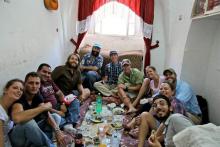
My heart is heavy.
Every day for the last week, media outlet have told their version of the current uprising stretching across the Middle East (Egypt, Libya, Yemen). Whether it’s pictures of embassies burned to the ground, rioting citizens, or highly politicized comics, the surge of content has been anything but “feel-good” and hopeful.
And that’s because the events and corresponding responses have been anything but “feel-good” and hopeful.
My heart breaks because I know the events that are unfolding do not represent the majority of those who inhabit the Middle East. I spend a significant amount of time in there and have built deep, life-long friendships.
Just two weeks ago I sat around a table and shared a meal with Christians, Jews and Muslims in the home of a devout Muslim family in the region. A day after that, I served alongside Muslim youth workers who are promoting non-violence and reconciliation in the face of oppression and poverty.
On the same day, I sat with an Arab Christian who embodied Jesus’ teaching in the Sermon on the Mount in dealing with daily injustice by saying, “We refuse to be enemies.” Lastly — and what keeps playing over and over in my head — are the words spoken to me by a Muslim friend named Omar who said,
“Please give this message to all of your American friends. We (Arab Muslims and Christians) desire peace. The violence you see in the news does not represent us. It is not the majority, it is the smallest minority of extremism. Please listen to our story and accept our friendship.”
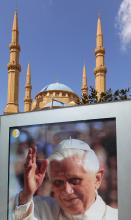
BEIRUT — As violent protests against an anti-Islam film spread to much of the Muslim world on Friday, Pope Benedict XVI arrived in Lebanon to a warm welcome from Christian and Muslim leaders.
The pontiff's appeal for peace and reconciliation in the region, however, stood in jarring contrast with violent clashes in the northern Lebanese city of Tripoli, which left one dead and 25 injured.
Landing at Beirut's airport in the early afternoon, Benedict praised Lebanon as an example of "coexistence and respectful dialogue between Christians and their brethren of other religions."
Without referring expressly to the unrest, the pope warned that the country's "equilibrium" is "extremely delicate."

Due to a temporary relaxation in Israeli policy, many Palestinians traveled to Jerusalem through checkpoints during Ramadan this year. But now that Ramadan is over, it’s back to business as usual.
Every day, thousands of Palestinians circumvent the Israeli separation wall by crossing into Jerusalem without permission from Israeli authorities. Israeli journalist Haggai Matar recently described this major flaw in the wall’s security rationale, even quoting a pro-barrier activist who admits:
“'There’s no problem crossing the gaps in the fence and tens of thousands of illegal workers cross it back and forth every day, and there should be no problem getting suicide bombers through with them,” stresses Ilan Tsi’on, co-founder of 'A Fence for Life.' 'So why don’t they? Because that’s the Palestinians’ choice.'”
The same logic applies to the checkpoints controlling movement within territory under Israeli occupation since 1967 — including East Jerusalem, which contains the Old City, the Haram Al-Sharif (or Temple Mount), and the Al-Aqsa Mosque. Though Israel unilaterally annexed East Jerusalem, no other nation recognizes the legitimacy of the action and international consensus still regards it as occupied Palestinian territory. That so many Palestinians routinely risk arrest and prison by circumventing these checkpoints — without incident — shows that their security rationale is absurd. While at the same time, the vast majority of Palestinians who try to play by the rules of occupation remain restricted under Israel’s matrix of control.
Conor Friedersdorf writes for The Atlantic:
Since 9/11, many Americans have conflated terrorism with Muslims; and having done so, they've tolerated or supported counterterrorism policies safe in the presumption that people unlike them would bear their brunt. (If Mayor Bloomberg and the NYPD sent officers beyond the boundaries of New York City to secretly spy on evangelical Christian students or Israeli students or students who own handguns the national backlash would be swift, brutal, and decisive. The revelation of secret spying on Muslim American students was mostly defended or ignored.)
In the name of counterterrorism, many Americans have given their assent to indefinite detention, the criminalization of gifts to certain charities, the extrajudicial assassination of American citizens, and a sprawling, opaque homeland security bureaucracy; many have also advocated policies like torture or racial profiling that are not presently part of official anti-terror policy.
What if white Americans were as likely as Muslims to be victimized by those policies? What if the sprawling national security bureaucracy we've created starts directing attention not just to Muslims and their schools and charities, but to right-wing militias and left-wing environmental groups (or folks falsely accused of being in those groups because they seem like the sort who would be)?
Read more here

After lobbying from Muslim and Sikh leaders, the Los Angeles Police Department has agreed to modify its information-gathering program on suspicious activities after the New York Police Department came under fire for spying on local Muslims.
Since 2008, the LAPD has used the federal Suspicious Activities Reporting (SAR) program to file reports on potential terrorist-related actions, such as someone photographing certain buildings. Sikh and Muslim leaders said the LAPD’s Counter-Terrorism and Criminal Intelligence Bureau should ensure that future suspicious activity reports are prompted by actual behavior with apparently genuine criminal or terrorist elements.
From Mother Jones this morning:
White House Counterterrorism adviser John Brennan officially acknowledged the administration's targeted killing of Al Qaeda members abroad for the first time in a speech on Monday. But Brennan didn't tell the whole story: He largely rehashed the legal rationale for targeted killings of specific Al Qaeda suspects, instead of defending the use of more controversial "signature strikes," in which targets are selected based on a "pattern of behavior."
Read the full story here
During the first-ever all-virtual interview conducted by Americans via Google+'s "hangout" group video chat feature, a young, homeless veteran in Boston asked President Obama why the United States still gives money to countries such as Pakistan, that are known to fund terrorism — especially when there are so many veterans living on the streets after returning from the war. The session was broadcast live via YouTube.
Watch the video of their conversation inside the blog...

GOP Candidates Show Sharp Differences On National Security And Terrorism; GOP Debate: Romney Aide Struggles To Answer Immigration Question While Attacking Gingrich; Occupy Pessimism; Occupying The Gospel; An America Less Friendly To Christians? Not In This Campaign Supercommittee Failure Confirms What Most Americans Believe About Congress; Evangelicals Assert Their Role In GOP Primary; Occupy Thanksgiving.

Chris Hedges' statement on Occupy Wall Street read in part:
As part of the political theater that has come to replace the legislative and judicial process, the Securities and Exchange Commission agreed to a $550 million settlement whereby Goldman Sachs admitted it showed "incomplete" information in marketing materials and that it was a "mistake" to not disclose the nature of its portfolio selection committee. This fine was a payoff to the SEC by Goldman Sachs of about four days' worth of revenue, and in return they avoided going to court. CEO Lloyd Blankfein apparently not only lied to clients, but to the subcommittee itself on April 27, 2010, when he told lawmakers: "We didn't have a massive short against the housing market, and we certainly did not bet against our clients." Yet, they did.